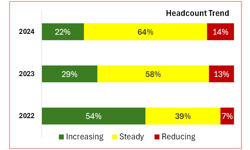Publishers of business and specialist titles have been used to reading ever worsening trade press on their newstrade prospects. The rising costs of retail schemes, poor compliance, the decline of independents and range cuts in the multiples. But are things as bad as they’re painted? Is there a future for business titles in the newstrade? In order to survive in the newstrade you need to be able to second guess where the next problem or opportunity will arise and try to be ready for it.
Threats and opportunities
Predicting threats and opportunities is not as daunting as it sounds. Look at current sales patterns for your titles. Are you heavily dependent on one or two retail groups? Is this likely to be a threat due to changing priorities for the group? How big are you to them in cash terms? How important in terms of customer satisfaction? Can you do anything about it? Look at the likely winners in the retail world – supermarkets, convenience stores, travel points, key independents – what is your current handling level, sales per outlet? If you find a group with low handling but high sales per outlet, then you probably have potential. If you have no handling in one of the likely winners can you get a foot in the door? Is there a sales story from a similar group? Can you run a test in selected stores to prove any potential? You can use any regional strengths to your advantage here. The bigger the retail group the more likely that they think nationally – a problem when looking for a listing but an opportunity when you are proving the possible potential.
So you have some ideas. How do you make them happen? Well it will sound obvious, but the newstrade is a chain! No promotion or strategy can succeed unless every link in that chain buys into it and believes that it will benefit them. To everyone in the chain it’s just one title of thousands – and many of the others are known top sellers. You need to motivate them and show them the potential. How?
Retail groups
Retailers will have little time for small titles because of low copy sales per outlet, high unsolds, limited space on racks and lack of budget for retail schemes. So you need to show the benefits:– regular readers, extra footfall, high cover price / frequency, conversion to shop saves etc. Maybe you do have budget for the right outlets, or perhaps you can advertise the group in your title or mail shots to point readers to them?
Think of what is important to the group – it may not always be money, some are keen to promote their service to customers. We have had delistings overturned because of the volume of sales (customers), not the revenue! The approach will vary; for some titles a straight sales story, for others it could be shifting customer base, delisting at other groups, comparison with a similar group – whatever. The promotion you plan with them will need to fit into their systems and limitations and make the most of their strengths and goals. It will also have teething problems. Try to make any agreement with a group for a reasonable period of time so that you can resolve the problems and get compliance sorted before the scheme is declared a waste of time. If you can’t get a six month agreement, go for six one month promotions. Can this be done? Yes.
* Example 1. We were losing handling and sales steadily in a key multiple for three titles in the transport industry. We found a new base in the three big motorway groups and gained agreement for a full listing in return for promotional spend and an advert saying we were there. We did this by proving to one group that we were among their top revenue earning titles, getting agreement there, then showing the results to the other two groups. Despite declining sales elsewhere these groups have steadily grown both in share and copy sales – we also have a solid availability base that we can point advertisers to.
* Example 2. A retail group selling ten copies a week per store in ten stores, of a title that sells for £2.50, were taking £12,750 RSV pa. If they accepted us in their other 70 stores then we estimated at least a five copy a store average and this would be worth £51,000. We are now over six copies.
A 400% increase in RSV pa!! Groups like these figures. Particularly if you compare to similar "top selling" titles; pick your own comparisons, most will be weekly, low cover price or monthly. OK, I hear you say, but most of my sales are currently through independents – how do I deal with them? And aren’t they declining too?
Independents
They are not declining that quickly. Most of the loss is due to conversion to other groups – convenience stores and symbol groups. The outlets are still there but may need to be approached differently. And to promote? Well the independent sales clubs – Superleague, Premier Group and Blockbuster - are all tried and tested ways of promoting.
You can also carry out handling exercises against similar titles – or be radical and use dissimilar titles with a similar target demographic. This moves us into the other links of the chain, wholesale and distributor. Retailers are busy people with creaking shelves. They will not put out two copies of a new title unless they have reason to think it will sell. You need to communicate very briefly and succinctly through the wholesalers to tell them why they should try it – delistings in groups are an opportunity for independents. Tell them why they have been chosen, and ask for their support, use POS gifts etc, either sent direct or via wholesalers.
Bear in mind that these methods are not copy efficient. You will get high unsolds initially. Bear this in mind also when planning supply levels. It is pointless sending two copies per agent to 4500 Superleague agents if you don’t increase your print order and just take the copies out from regular handlers. You will lose availability and sales elsewhere. Let the wholesalers and distributor know that you have thought this through – that they will gain in the longer term. They too need to buy into what you are doing, so don’t forget to tell them when something has worked.
The rest of the chain
Details of the promotion, date, duration, copies, and POS etc need to arrive accurately and on time at:- shop manager, retail head office, wholesaler, distributor. Neither the shop manager nor the wholesaler will action your scheme if they haven’t had it confirmed from the retail group. So check that notification has gone out. Ask for a copy if necessary so that you can forward to those that have "missed" it.
So you have retailers, wholesalers and distributor on board – will your promotion work? Allocations need to be planned in advance with your distributor and broken out by wholesaler. Does the list of stores that the group thinks it has, tie in with the shops listed on wholesale and distributors systems? Surprisingly often the answer is no. The shop may be listed under an old group name or have the wrong grade. In these cases the distributor won’t target the outlets with copy or include them in the brief, and even if they do, wholesale systems will not allocate copy. They may also still have shops listed that have been sold off and these would then be allocated copy. So don’t just look at the total numbers. Check in advance and resolve any discrepancies with the retail contact and distributor.
Review and feedback
No you can’t relax yet. Now let’s review the promotion a week in. Get feedback! Ask for early return reports, box level analysis showing supply levels, visit some stores or pay a merchandising service. Dig deep and identify the problems. It will probably be soul destroying to find that early returns are an issue, half of the shops didn’t have copies or POS and knew nothing about the promotion and others had sold out.
So now you have to tackle these; find out why there is an issue and find a way to resolve it. There will always be some areas where the communication wasn’t clear (or was ignored) or no one took into account a system limitation. Then start looking at net sales. Address sell outs with further briefings, check nil sales – they may not be early returned but are they going on the shelf? It may seem like a lot of detail to check, but this is a strategically important group so spend time on it.
Finally, either you have a winner or not. Tell people. If it didn’t work and you are honest then you will have credibility next time or with another title. But more importantly if it did work, make sure that everyone knows and highlight the extra sales and revenue, thank them for their help and congratulate them, look for ways to build on this success with the group concerned. Then look for anywhere else you can use this success story to claw back some more business. Easy isn’t it?
A future?
So is there a future for business titles in the newstrade? I believe so. I don’t think that all titles will last, but as the newstrade continues to change and evolve there will always be some titles that can move with it and find ways to survive – and who knows, even grow!
FEATURE
Marketing business titles through the newstrade
Perpetual motion and no rest are the secrets of success for business titles in the newstrade – that and having quality product. Martin Parr, newstrade manager of Reed Business Information talks us through the ins and outs of marketing RBI’s titles through the newstrade.










